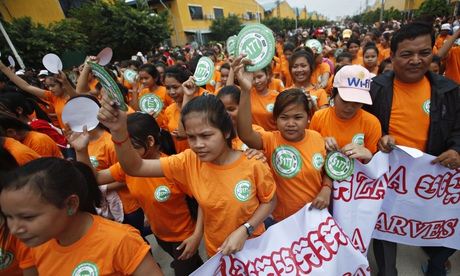
Garment workers protest for higher wages in Phnom Penh. Photograph: Samrang Pring/Reuters
Eight leading fashion retailers have said they are prepared to pay more for clothes made in Cambodia, days after thousands of workers took to the streets of Phnom Penh to call for the minimum wage there to be nearly doubled to $177 (£110) a month.
The brands, which include one of Cambodia's biggest buyers, H&M, as well as Inditex, owner of Zara, and Britain's Primark, have written to the Cambodian deputy prime minister and the chairman of the local Garment Manufacturers Association to say they were "ready to factor higher wages" into their PRICING .
.
 .
.
It follows a day of action in and around the Cambodian capital on Wednesday involving thousands of clothing workers wearing orange T-shirts demonstrating outside factories in their lunch hour. Workers are demanding a significant rise in the minimum wage from the current £62 a month. At one point the army were called out to confront protesters.
The big-name companies, which have been joined by Next, New Look, C&A and N Brown Group, a home-shopping firm, said in the letter that they wanted to see "more cooperation with TRADE unions in the workplace".
unions in the workplace".
 unions in the workplace".
unions in the workplace".
The letter states: "Our purchasing practices will enable the payment of a fair living wage and increased wages will be reflected in our prices, taking also into ACCOUNT productivity and efficiency gains and the development of the skills of workers, carried out in cooperation with unions at workplace level."
productivity and efficiency gains and the development of the skills of workers, carried out in cooperation with unions at workplace level."
 productivity and efficiency gains and the development of the skills of workers, carried out in cooperation with unions at workplace level."
productivity and efficiency gains and the development of the skills of workers, carried out in cooperation with unions at workplace level."
Jyrki Raina, general secretary of IndustriALL Global Union, the union federation that has coordinated the action, welcomed the "'unparalleled" letter.
He said: "The brands state their willingness to incorporate higher wages by paying more for garments. Factory owners have no excuse not to pay their workers more.
"What's more, the Cambodian government should raise the minimum wage significantly. The letter also shows the brands recognise that unions are key to securing better worker rights, a fair living wage and a stable MARKET ."
."
 ."
."
The plight of clothing factory workers was pushed centre stage in April last year when 1,130 were killed and many more injured in the collapse of the Rana Plaza factory building in the Bangladeshi capital, Dhaka.
Retailers stood accused of hiding behind middlemen to get clothes made for the cheapest price with little regard for workers' pay and conditions. Workers in many developing countries are paid less than £3 a day to produce CHEAP CLOTHES for retail chains in the west.
for retail chains in the west.
 for retail chains in the west.
for retail chains in the west.
The growth of the Cambodian clothing manufacturing sector has become a vital but troublesome issue for the government. It has been a boon for the fledgling economy, providing as many as half a million JOBS and generating £3bn annually, but frequent protests by increasingly assertive unions have tested the government's patience.
and generating £3bn annually, but frequent protests by increasingly assertive unions have tested the government's patience.
 and generating £3bn annually, but frequent protests by increasingly assertive unions have tested the government's patience.
and generating £3bn annually, but frequent protests by increasingly assertive unions have tested the government's patience.
Ath Thorn, president of the Cambodian clothing workers union, welcomed the letter but called on the brands to take real action and negotiate DIRECTLY with workers.
with workers.
 with workers.
with workers.
"We know from past experience that just a letter isn't strong enough – the brands must take additional action immediately to ensure a higher wage for Cambodian workers.
"To achieve long-term stability and decent wages, we need the ones who make the biggest profits to be ACCOUNTABLE ."
."
 ."
."
No comments:
Post a Comment